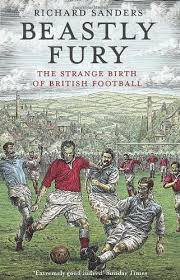Book Review – Beastly Fury: The Strange Birth of British Football by Richard Sanders
 What a strange main title it seems for a book about football, until you read what it is referring to (page 78)! The subtitled part takes rather longer to develop, naturally, since that is the central theme and Sanders does take a while to get into his stride, mainly because he is detailing the growth of football in the British public schools.
What a strange main title it seems for a book about football, until you read what it is referring to (page 78)! The subtitled part takes rather longer to develop, naturally, since that is the central theme and Sanders does take a while to get into his stride, mainly because he is detailing the growth of football in the British public schools.
The narrative then becomes very good indeed as Sanders builds the argument that football was actually rescued from the public schools and finally appropriated by the working man. Only then was it in a position to become the national game, although the public-school educated elite continued to hold back the game in any way they could, mostly through the shameful favouring of so-called amateurs (i.e. them, the ruling class) over the unspeakable professionals (i.e. us, the rest).
Although the book is centred on football, it is arguing a larger case – the unfairness of the class structure – and, although it is clear where the author’s sympathies lie, he does it well and with a fair degree of objectivity.
Eventually, the whole title is fully explained and, as such, makes the wider claim that the men from public schools, once they’d stopped playing with themselves and each other, went on to spawn the child that is modern football. In this strange, Freudian reading, the mother, then is the working class.
It is a good book though, full of fascinating detail and it is scrupulously researched. Sanders has expertly synthesised a wide range of source material and put it into a narrative that only loses its authority and cogency on the odd occasions when it wanders off football into general theorising about society.
It is not a light read but is packed with interest and broken into logical chapters, each introduced by an apt quotation and with thoughtful and sometimes thought-provoking headings such as ‘A Most Unfeminine Exhibition’. Sanders cares about the humanity of the people involved, too. This comes across most clearly in his profile of Billy Meredith, shown in many guises and over many years.
Sanders is particularly adept at charting the conflicts and power struggles that shaped the game we now know; the public school ‘amateur’ versus the working class professional, the rise and rise of the F.A., the triumph of the club directors over player power, the difficulties faced by women who wanted to take up the sport in a hostile Victorian era. His reasoning is persuasive since, after all, a football match is a form of conflict.
His final chapter, ‘Football at War’, is the most impressive one, neatly summarising what has gone before and focusing on an extract from J.B. Priestley’s The Good Companions which so neatly encapsulates why football became the national game for the working man.
I suppose you could read the final chapter and skip all the rest but, if you did, you would miss so much.
Graeme Garvey